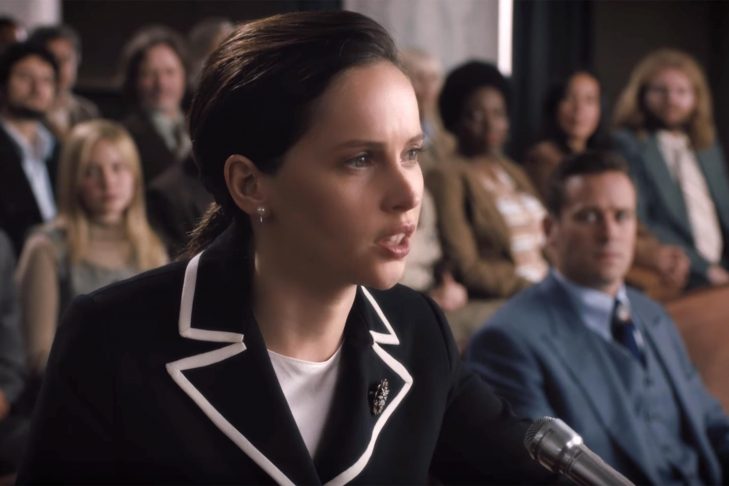It’s the fall of 1956 and among a sea of dark suits is a woman in a blue dress. Her name is Ruth Bader Ginsburg and she is one of nine women who have been admitted to Harvard Law School that year. The striking image portends the story of the challenges the future Supreme Court justice will face over the next two decades because she is a woman. As if this isn’t obvious enough, the dean of the law school, Erwin Griswold, played by the excellent Sam Waterston, condescendingly reminds the women they are taking a man’s seat. The notion of equality at Harvard Law School in the middle of the 20th century is true in theory only.
With a recently published doorstopper of a biography about her, a successful 2018 documentary simply titled “RBG” and now its narrative counterpart, “On the Basis of Sex,” Ginsburg’s canonization as an irreplaceable liberal voice on the court is nearly complete. The news of her latest health scare—the removal of two cancer nodules on her lung—is a sober reminder of just how critical her position on the court is and how physically vulnerable she can be.
In some ways, “On the Basis of Sex” depicts the black-and-white moments in which the sexes were neatly slotted into stereotypes. It was a man’s world, and despite the fact that Ginsburg is consistently first in her law school class, she is shown the door at every law firm to which she applies after graduation.
As trailblazing as her life has been, luck played a pivotal role when she met Martin Ginsburg as an undergraduate at Cornell University. Played by Felicity Jones and Armie Hammer respectively, their marriage is a leading example of how beautifully gender equality can work. The film leaves no doubt that Ruth has an exceptional mind and an iron will. When Marty is diagnosed with life-threatening cancer, Ruth takes over and keeps up with his coursework, as well as her own.
Marty will lovingly return the favor as he supports his wife in the home, as well as in her career. He’s a man who does the cooking and helps take care of their children. When Ginsburg faces a slew of micro-aggressions underlying the rejections she receives at every law firm to which she applies, she turns to academia and teaches law at Rutgers University. But she is frustrated not to have her day in court. She wants not only to teach the law but also to change it in fundamental ways.
At this midway point in the film, the clichés have been stacking up fast. Hammer’s role is relegated to the equivalent of the one-dimensional role of “behind every great man there is a woman.” It’s also evident that Jones, as hard as she tries to reproduce Ginsburg’s fire and brimstone when it comes to the severe gender inequities in the law, falls as flat as the Brooklyn accent the British actor tries to reproduce.
Granted, it’s not easy to play a living American icon at the formative stage of her legendary career. Jones mostly rises to the challenge by showcasing Ginsburg’s quick wit, brilliant imagination and incomparable work ethic. But Ginsburg wants to affect change rather than only inspire it. Her day in court eventually comes in the early 1970s with a case to which Marty has alerted her.
Ginsburg collaborates with Marty on the case, in which a single man has been denied a tax deduction to hire a caregiver for his mother. The assumption is that caregivers must be women, and the irony here is evident. In Ginsburg’s first gender rights case, she defends a man. But the rights of one man are not all that’s at stake here—Ginsburg’s fight to create a legal precedent dismantles generations of American law deployed to discriminate on the basis of sex.
Ginsburg begins her argument in front of the 10th Circuit Court of Appeals haltingly. Although the audience knows she will find her voice in her closing remarks, the scene could have used a bigger dose of suspense. Instead, hindsight is driving the plot points of the film.
In the mix is Ginsburg’s friend Mel Wulf, the legal director of the ACLU, whom Justin Theroux plays for mostly obnoxious comic effect. He’s there to help Ginsburg with her case, but in the process shows that even the best-intentioned allies can at times be chauvinistic. Ginsburg’s teenage daughter, Jane, grew up to be a law professor at Columbia, but is overly precocious and not particularly believable in her role as a budding second-wave feminist.
At the end of the film, the real Ruth Bader Ginsburg walks up the steps of the Supreme Court, where she had successfully argued countless cases of gender discrimination before she was a justice. Her voice as it was recorded in the court serves as a voiceover. RBG is still thrilling to listen to as she presents her brilliant arguments. Her appearance also signals her approval of the film and its screenplay, which was written by her nephew, Daniel Stiepleman.
Ruth Bader Ginsburg forever changed how gender equality is considered in American law. But “On the Basis of Sex” is too subtle and too quiet on how she went about doing it.











